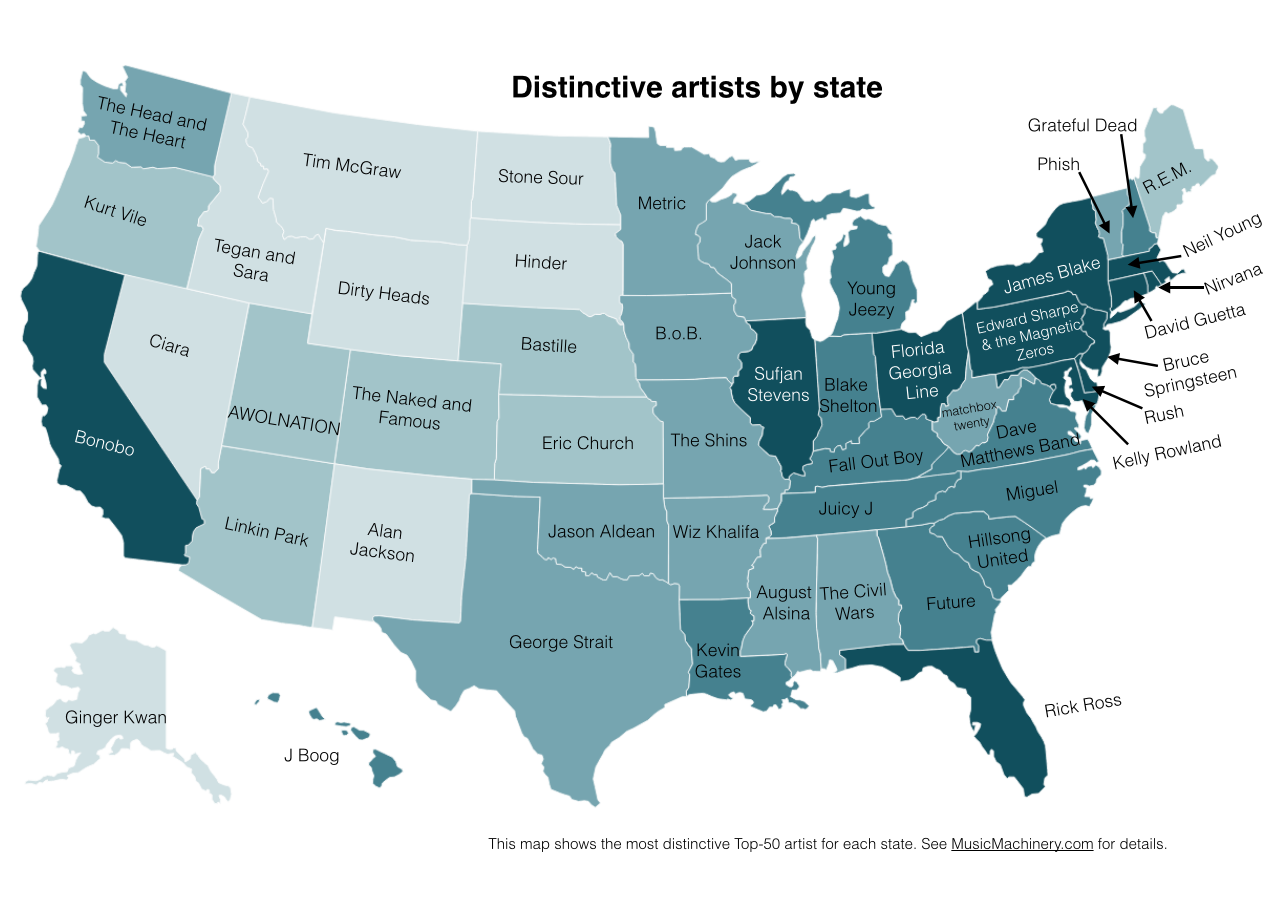Hyperbolic Headlines are Worse than Hitler
March 3, 2014 Leave a Comment
TL;DR – Kids these days suck at journalism.
It’s no secret that Internet headlines are sliding toward “clickbait” – surprising, flashy, sexy phrases promising mind-blowing facts or crazy stories. That’s what headlines are for, right? To attract interest?
Sure. Then there are the ones that just lie.
Top(ish) of the charts
Last week, a map of the US spread across social networks with the headline, “Here’s Every State’s Favorite Band”. It originally ran at Business Insider and was soon picked up by Slate, Time, and (as Nashville Scene accurately pointed out) “goddamn Buzzfeed“. Not a single one of them bothered to read the original blog post by the guy who made the map, or even looked at the map with an even slightly critical eye. Give it a cursory glance:
Anything pop out at you? Anything seem a little weird? Like maybe there’s precisely zero repetition of “favorite” artists between states? That a lot of even famous bands don’t seem like today’s chart-toppers? That the word “favorite” isn’t on the map?
It comes from a blog entry with the extremely non-clickbaity title “Exploring regional listening preferences“. Written by a director at a data intelligence company focusing on listening habits of users of music streaming servers, the post itself does not contain the word “favorite” either – not once. In fact, the map shows something much more nuanced: the band or artist with the greatest differential in popularity between that state and elsewhere. And of course it’s not a formal study, being based on data from this one company.
Slate, at least, changed its headline to be slightly more accurate – two days later. By that time, the original blogger had put up a new map giving the Internet the easily-digestible factoid it wanted: that the Southwest loves Drake, Jay-Z is the favorite in almost every state east of the Mississippi, and South Dakota is the only place Imagine Dragons is on top.
Not quite right
In the sidebar of one of these articles this weekend was a link to a New York Magazine Story, “Meet the 4 Most Desired People in New York (According to OKCupid)“. Citing a source right in the headline – nice job! If only the article itself didn’t admit that the title is complete bull.
Rudder analyzed the data from a one-week period in January and used a simple methodology: finding the users who receive the most messages from potential suitors. The four people selected wouldn’t necessarily claim to be the wealthiest, most stunning or successful singles, but, out of 400,000 annual citywide users on the site, they were among the top five in their respective categories and, perhaps less scientifically, were the four who were also willing to be interviewed for a story.

This picture isn’t relevant to anything I’m saying, but it came up in a stock photo search for “interview” and he seems to want attention so what the hell?
The author chose one person from each of four categories: straight women, straight men, gay women, and gay men. Right there you have something a bit different from “the 4 Most Desired People” but that’s a quibble compared to actually selecting interviewees “among the top five” rather than the true number one. Moreover, the author went on to describe each person as, respectively, “the most sought-after straight woman”, “New York’s most popular straight guy”, “OKCupid’s most popular gay-woman’s profile”, and “the site’s most sought-after gay man”. Even forgiving the imprecise language omitting “in New York” or “on OKCupid during a single week in January” in every case, it contradicts the (understandable!) criteria actually used.
These hyperbolic headlines often don’t stand up to the least bit of scrutiny. In January, Fast Company promised “A Look Inside the Last New York Times Site Redesign Ever“. That’s patently ridiculous. The second sentence states, “That’s not to say that the Times will never again update its digital look.” Okay then, so why say so in the headline? To get me to click, obviously; either because I want to know more about this amazing story or because I want to know exactly how you justify your unbelievable phrasing. Neither of those tactics is anything but sleazy.
Then again, they work.





